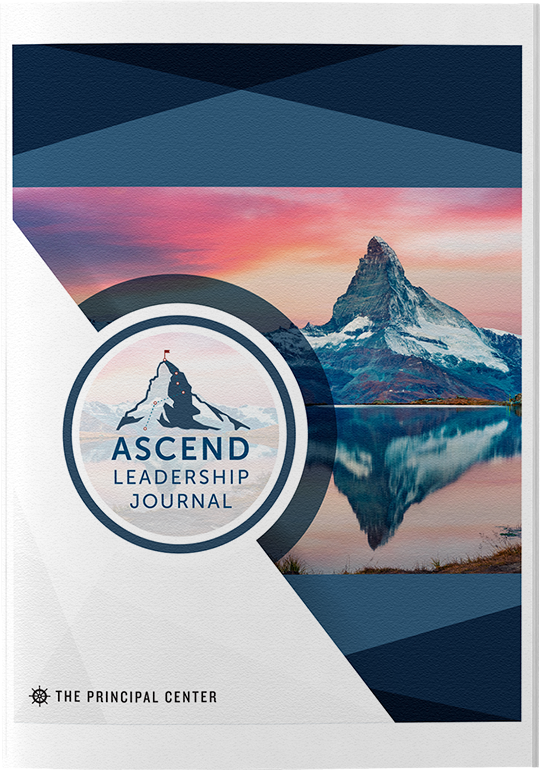Thanks and welcome to The Principal Center!
Check your email in just a moment for the PDF download link.
Important: before you leave this page, make sure you're not wasting your #1 asset as a rising leader: the experience you're gaining right now.
If you're not documenting your experience, you'll forget the specific details that would make you stand out as a candidate
Making the most of your experience is THE key to landing more interviews and getting more offers for ed leadership jobs.
Think about it like this: when you're applying for a job, you're up against stiff competition.
Other people want the same job—and some of them have more experience.
But do they have better experience? Not if they aren't documenting it.
Most people move from one task to the next without jotting down even a single note about their experience.
This gives you an opportunity: if you're willing to keep track of your accomplishments, you'll be able to mention them in your résumé, in your cover letter, and in interviews.
You'll be able to remind your references to mention specific projects you've worked on, or situations you've handled, when they're writing recommendation letters for you.
But if you don't document this experience, you'll quickly forget about it.
Most people tell themselves "I don't have time! I'm too busy to keep a diary.
I get it. You're incredibly busy, and you definitely don't need to write a play-by-play of everything you do.
But there are key types of experiences that are easy to document, easy to turn into great stories, and perfect for bulking up your résumé with real-world experiences.
The key is to be selective about what you document, so you don't waste time keeping a Ben Franklin-style diary about the weather and what you ate for breakfast.
For example: situations involving conflict are pure gold—yet because they're unpleasant, people usually want to forget them as quickly as possible.
Handling conflict calmly and professionally is GREAT experience—even if it doesn't feel like it in the heat of the moment. But if you reflect on the situation later, you'll have a great story to tell in an interview or in your cover letter.
Just jot down just a few details about a conflict you've just handled, and it'll become an asset that makes you a better candidate.
Remember, you don't need MORE experience than your competition—you need BETTER experience.
There's a big misconception that "He who has the most experience, wins."
No—not at all. It's more like "She who can tell the best story to illustrate her experience, wins."
I want you to be able to tell the story of your leadership—not by being a smooth talker or bragging, but by sharing real evidence from your professional experience.
To tell an evidence-based story about your leadership, you've got to start documenting your experience, today.
I've identified the key categories of experience you need to document in the Ascend Leadership Journal, which I share with all of my Ascend Masterclass students and clients.
I've already shared one—conflicts. Any time you hang up the phone or end a meeting after dealing with a conflict, that's your cue to document the experience.
Just a few words—like "Johnson attendance meeting"—should be plenty.
Once you know the cues, documenting these key experiences will become automatic. You'll reach for your journal, jot down a few words, then get right back to what you were doing.

No need to block off 30 minutes a day for journaling—just a quick note, then right back to work.
Every day, my clients and students are doing just that in the Ascend Leadership Journal, and I want to give you the same opportunity.
But first, I need to confess my secret agenda: I only want to help people who are committed to instructional leadership.
I'm not interested in helping anyone who thinks instructional leadership is someone else's job.
Look, if you're in this just for the money, and have no interest in having an impact as an instructional leader, you can leave this website now. Best of luck to you.
But if you believe instructional leadership matters, and if you're committed to growing as an instructional leader as you seek your next leadership role, then I think our interests overlap.
If you're committed to having an impact on student learning, you're the kind of person I want in the Instructional Leadership Association.
Every week, I share new tools and strategies with our members—like how to provide more effective feedback, or how to use evidence to complete teacher evaluations in less time.
Give the Instructional Leadership Association a try for 30 days, and I'll give you instant access to the Ascend Leadership Journal, so you can start documenting the experience you're gaining right now.
All that hard-won experience will stop going to waste, like water under a bridge. You'll put it to good use, like a stream that turns a water wheel.
I'll also send you my book on getting into classrooms and having feedback conversations that change teacher practice. It's called Now We're Talking! 21 Days to High-Performance Instructional Leadership, and it's the only book with a proven track record of helping leaders get into classrooms 500 times a year.
Sign up below, and you'll have a full 30 days to see if the Instructional Leadership Association is right for you. There's no obligation to continue—just send us an email or voicemail if you want to cancel—and the book and journal are yours to keep.
To make things even easier, we can print and coil-bind the Ascend Leadership Journal for you at cost, if you prefer—just select the hardcopy option on the form below, and we'll get it right out to you.
Sincerely,
Justin Baeder, PhD
Director, The Principal Center
1-800-861-5172
